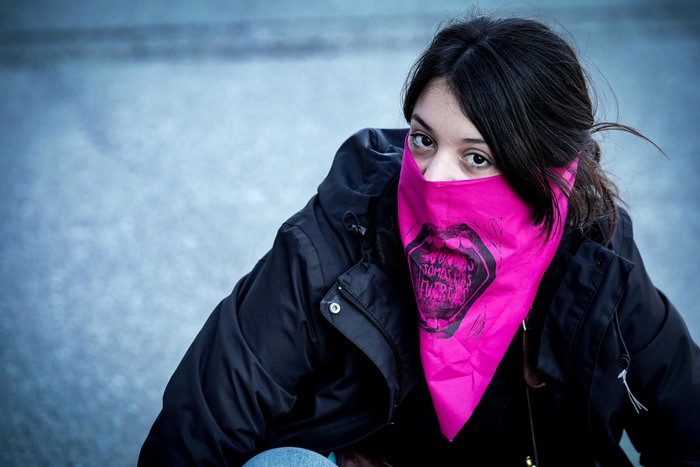Global society
all articles
Japan is considered an advanced nation, its citizens respectful, polite and regular. But the country has a dark side: more than 70 percent of Japanese women were sexually harassed at least once in their lives. The problem is so great that Tokyo Metro offers a women-only wagon at peak hours to protect it from abuse.
Rarely are the perpetrators prosecuted: Because the hurdles to prosecute in Japan are high, few cases end up in court. Victims who make their story public must reckon with hatred.
Journalist Shiori Ito tried in 2015 in vain to hold her alleged rapist to account. Ito denounced the man privately - and was so hostile that she finally had to leave the country. (Read Shiori Ito's story here.)
Three Japanese women explain why their culture discriminates against women - and how they try to change that.
Minori Kitahara, 48, owner of a sex shop for women
Private
Minori Kitahara: "Small steps, but something is happening"
"When I was ten years old, I drove with my dad in an elevator, and there was a man standing behind me, and when the door closed the stranger started to touch me from behind, I did not say anything, I did not want my dad Spoil day.
This is how girls are educated in Japan: We should be friendly and kind. Men are taught to stand above the women. This discrimination has system. For example, at the Tokyo Medical School, admission tests were falsified for years, so that fewer women study there.
I was lucky to have a role model: My grandmother was a strong woman and ran her own hotel. Everyone in the store had respect for her. The older I got, the more I wanted to be like her.
In 1996 I founded my first company: an agency that programmed websites. At least half of our orders at that time were porn sites. It happened that I came across a feminist sex shop in the US. I had never seen anything like it.
Sexuality is very masculine in Japan: the shops are full of things that are banned in other countries. For example, some toys are reminiscent of the genitals of children. I wanted to do something different, a room where women feel comfortable.
For several years I run a sex shop for women in Tokyo. There are not only toys, but there are also lectures. For example, how to assert yourself as a woman in the profession.
Harassment is a big problem in Japan - but it's not talked about. Many do not dare to use the hashtag #MeToo. That's why I called for a demonstration in the spring. There were several hundred women. Since then, the 'flower demonstration' - it's called this because every woman wears a flower - takes place every month. We are getting more and more. It's small steps, but something is happening. "
Rika Shiiki, 21, marketing entrepreneur
Private
Rika Shiiki: "Professionally, it hurt me to make public what happened to me"
"Two years ago, I had a dinner date with a customer, he went to the bar to order for me, and I was not old enough to drink alcohol, so I asked him to bring me some juice.
The drink he gave me tasted strange. About half an hour later, everything began to turn suddenly. The surroundings blurred in front of my eyes.
I got scared. I wanted to cancel the appointment and drive home. But my customer kept saying: Stay still. Why do you want to go already?
I took a taxi anyway. Later, I googled my symptoms and came across something called rape drug online. I think the man had dumped something in the drink to make me dizzy.
I wrote about my experience on Twitter. It was important to me to warn other women. The reactions were terrible. I was hoping for support, instead I got thousands of hate comments. I was accused of lying. Still today I get such news.
In Japan they say: Silence means beauty. The men here love a certain type of woman: quiet, friendly, no independence. That's the way it should stay.
Many women behave just as men expect it. We have no sisterhood culture, we do not support each other. I was disappointed and shocked that so few women admit to me.
I am rarely invited to talks with clients today. Larger companies keep their distance. Professionally, it hurt me that I made public what happened to me.
But at least there is now a debate about sexual assault. Men learn that it is not right to molest a woman. That should be normal. But it's not that in Japan. "
Kanoko Kamata, 41, activist
Private
Kanoko Kamata: "We can not wait any longer" +
Instead, I have a job, which is unusual in Japan, where many women here dream of getting married early and giving up their own lives - they have not learned otherwise: Japanese women have been doing so for generations.
Anyone who works in Japan is practically a slave to his company. You have to be available 24 hours a day, 365 days a year. Many women do not want that and therefore prefer to become a housewife. That is understandable on the one hand. On the other hand, it leads to very few female executives.
This hierarchy favors abuses. In addition, there is the Japanese image of women: It is our job to make people happy and not burdened by negatives. Even in the world of work there is this expectation. I know brilliant women who try to never act aggressively in the job, so that no man feels uncomfortable. Likewise, they also respond to attacks: smile away, endure.
I used to think so too. I studied chemistry and then worked in the import business. In my early thirties I decided to go to Harvard and do a Politics Master. At that time, I thought: This is the last chance before I get married and have children. Then I saw that my American classmates were studying, even though they were married and had children. That opened my eyes.
Today I lead workshops in which I practice with women to fight back. They have to overturn a table. I want to encourage them to be self-confident, show them that it's okay to get angry. Only those who dare, also stands for his rights. Japan has to change. We can not wait any longer. "
This article is part of the project Global Society, for which our reporters report from four continents. The project is long-term and supported by the Bill & Melinda Gates Foundation.
What is the project Global Society?
Under the title Global Society, reporters from Asia, Africa, Latin America and Europe will be reporting on injustices in a globalized world, socio-political challenges and sustainable development. The reportages, analyzes, photo galleries, videos and podcasts appear in the Politics Department of SPIEGEL. The project is long-term and will be supported over three years by the Bill & Melinda Gates Foundation (BMGF).
Are the journalistic contents independent of the foundation?
Yes. The editorial content is created without the influence of the Gates Foundation.
Do other media have similar projects?
Yes. Major European media such as "The Guardian" and "El País" have created similar sections on their news pages with "Global Development" or "Planeta Futuro" with the support of the Gates Foundation.
Was there already similar projects at SPIEGEL ONLINE?
SPIEGEL ONLINE has already implemented two projects in recent years with the European Journalism Center (EJC) and the support of the Bill & Melinda Gates Foundation: The "Expedition The Day After tomorrow" on Global Sustainability Goals and the journalistic refugee project "The New Arrivals" Several award-winning multimedia reports on the topics of migration and escape have emerged.
Where can I find all the publications on the Global Society?
The pieces can be found at SPIEGEL ONLINE on the topic page Global Society.









